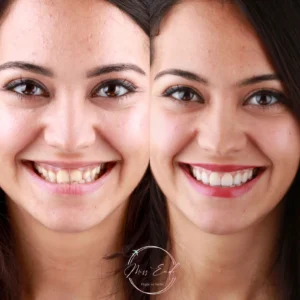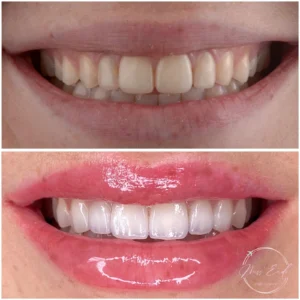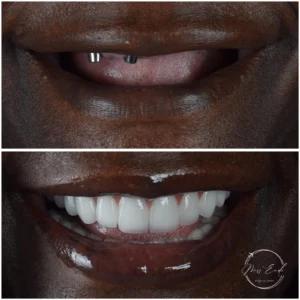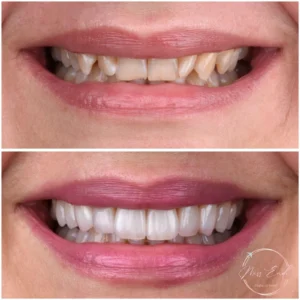
Partial dentures are removable dental prosthetics designed to replace one or several missing teeth while preserving the remaining natural teeth. Unlike full dentures, which are used when all teeth are missing, partial dentures are used when some healthy teeth remain. These dentures not only fill the gaps left by missing teeth but also help maintain proper alignment by preventing the remaining teeth from shifting. Partial dentures are custom-made to fit comfortably and blend naturally with your existing teeth, providing a functional and aesthetic solution for restoring your smile.
Benefits of Partial Dentures
💫 Partial dentures enable individuals to chew and speak more effectively by replacing missing teeth. This restoration allows for a better diet and improved communication.
💫 Custom-made to match the color and shape of your existing teeth, partial dentures provide a natural look that enhances your smile and boosts your confidence.
💫 By filling the gaps left by missing teeth, partial dentures help prevent the remaining natural teeth from shifting or becoming misaligned, which can lead to additional dental problems over time.
💫 Compared to other restorative options like dental implants, partial dentures are generally more affordable, making them a viable choice for individuals looking to restore their smiles without significant financial investment.


💫 Partial dentures are a non-surgical option for tooth replacement, which makes them a suitable choice for individuals who prefer to avoid invasive dental procedures.
💫 Being removable, partial dentures allow for easy cleaning and maintenance, helping to promote good oral hygiene and preventing issues such as gum disease.
💫 Partial dentures are designed to fit the unique contours of your mouth, ensuring comfort and stability while in use.
💫 By filling in gaps where teeth are missing, partial dentures can improve pronunciation and reduce slurring, enhancing overall speech clarity.
💫 The restoration of a complete smile can significantly improve self-esteem and confidence, allowing individuals to engage more freely in social situations.
💫 Partial dentures can be used in various situations, whether you are missing one tooth or multiple teeth, making them a flexible option for different dental needs.
Disadvantages of Partial Dentures Compared to Dental Implants
1. Stability and Security: Partial dentures are removable and can shift or slip during eating or speaking, leading to discomfort or embarrassment. Dental implants are anchored directly into the jawbone, providing a secure and stable solution that functions like natural teeth.
2. Bone Loss Prevention: Partial dentures do not prevent bone loss in the jaw, which can occur after tooth loss. In contrast, dental implants stimulate the jawbone, helping to maintain its density and structure over time.
3. Comfort: Many patients find dental implants more comfortable than partial dentures. Implants integrate with the jawbone and do not cause gum irritation, whereas partial dentures can cause sore spots or discomfort, particularly during the adjustment period.
4. Durability and Longevity: While partial dentures may last several years, they typically require replacement or adjustments more frequently. Dental implants are designed to be a permanent solution and can last a lifetime with proper care.


5. Functionality: Implants restore chewing ability more effectively than partial dentures. Patients with implants can eat a wider variety of foods without fear of their dentures slipping, making them a more functional solution.
6. Aesthetic Appeal: Dental implants often provide a more natural appearance, as they look and function like real teeth. Partial dentures may not achieve the same level of aesthetics, especially if they do not fit well.
7. Maintenance: Partial dentures require daily removal and cleaning to maintain oral hygiene, which can be cumbersome for some individuals. Dental implants, however, are maintained like natural teeth with regular brushing and flossing.
8. Impact on Remaining Teeth: Partial dentures can place pressure on the adjacent natural teeth, potentially leading to misalignment or other dental issues over time. Implants do not affect surrounding teeth since they stand alone.
9. Adjustment Period: While many people can adapt to wearing partial dentures, there can be a significant adjustment period during which patients may experience discomfort. Dental implants do not require such an adjustment, as they are surgically placed and immediately function like natural teeth.
10. Psychological Impact: Some patients may feel self-conscious about wearing removable dentures, viewing them as a temporary or less desirable solution. Implants, being permanent, can enhance self-esteem and confidence regarding appearance and functionality.


Who Is Not Suitable for Partial Dentures?
While partial dentures can be an effective solution for many individuals missing one or more teeth, they may not be suitable for everyone. Several factors can influence a person’s candidacy for partial dentures, including:
1. Severe Gum Disease: Individuals with advanced gum disease may not be suitable for partial dentures, as the condition can compromise the gums’ ability to support the prosthetic, leading to discomfort and further oral health issues.
2. Insufficient Jawbone Structure: Those with significant bone loss in the jaw may struggle to achieve a secure fit with partial dentures. Adequate bone structure is necessary to support the prosthetic and maintain its stability.
3. Allergic Reactions: Some individuals may be allergic to the materials used in partial dentures, such as acrylic or metal. This could lead to irritation or adverse reactions, making dentures unsuitable.
4. Poor Oral Hygiene: Individuals who have difficulty maintaining good oral hygiene may not be suitable for partial dentures, as improper care can lead to gum disease, infections, and issues with the dentures themselves.
5. Cognitive or Physical Limitations: People who have cognitive impairments or physical limitations that make it difficult to care for removable dentures may not be ideal candidates. Partial dentures require daily removal and cleaning, which can be challenging for some individuals.
6. Psychological Factors: Some patients may have anxiety or psychological discomfort regarding removable dentures. This can impact their willingness to adapt to and wear partial dentures effectively.


7. Significant Tooth Movement: Individuals with severe tooth movement or misalignment may not be suitable for partial dentures, as the remaining natural teeth can shift further without the proper support, affecting the fit and function of the dentures.
8. High Gag Reflex Sensitivity: Those with a strong gag reflex may find it challenging to adapt to partial dentures, particularly if the prosthetic covers a significant portion of the mouth.
9. Desire for Permanent Solutions: Individuals looking for a more permanent solution for tooth replacement may not find partial dentures suitable, as they are removable and may require replacements or adjustments over time.
10. Active Oral Health Issues: Patients experiencing active oral health problems, such as infections or untreated cavities, may need to address these issues before considering partial dentures.
11. Alternative Options Available: If a patient has the option to receive a dental bridge, this may be a more stable and secure solution than partial dentures. Bridges can provide a fixed solution that enhances chewing efficiency and requires less maintenance than removable dentures.
For those who may not be ideal candidates for traditional partial dentures, alternative solutions like dental implants or fixed bridges might provide better outcomes based on individual needs.


Premium Dental Care From Turkey’s Leading Specialists in Istanbul and Antalya

Miss Endo
Free Consultations and Aftercare are Available in Los Angeles Through Miss Endo





